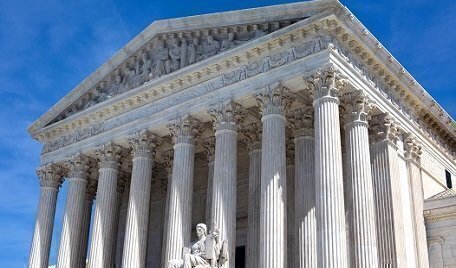With no noted dissent, the Supreme Court on Monday turned down — for now — the Trump Administration’s request to delay or block a group of teenagers’ sweeping lawsuit that seeks to force the federal government to protect the climate they will live in as they grow up. At the same time, however, the Court cautioned the trial judge handling the case to be wary about the sweep of what the lawsuit is asking.
 The youths’ lawsuit involves their claim to create a fundamental new constitutional right “to a climate system capable of sustaining human life.”
The youths’ lawsuit involves their claim to create a fundamental new constitutional right “to a climate system capable of sustaining human life.”
In what is probably the last action in which Justice Anthony Kennedy will take part before his retirement on Tuesday, the Court urged the Oregon federal judge handling the case to rule promptly on the Administration’s two-pronged attempt to shut down the case altogether. U.S. District Judge Ann Aiken of Eugene, Ore., held a hearing on those requests earlier this month but has yet to rule.
The case, one of several filed in recent years by legal advocates for teenagers worried about their environmental future, is currently scheduled to go on trial in Eugene in late October; the judge has scheduled 50 days for the trial. This particular lawsuit has been developing for nearly three years.
In refusing as “premature” the Administration’s multiple requests to thwart the lawsuit, the order issued by the Court on Monday called the basic constitutional claim in the case “striking” in its breadth, and commented that there are “substantial grounds for difference of opinion” about whether the case was simply too ambitious even to be allowed to proceed in court.
The nature of the lawsuit in its present form, the order added, requires the trial judge to take the government’s concerns into account as she decides on pre-trial disputes over evidence, and indicates “the desirability of a prompt ruling” by Judge Aiken on the two government motions to dismiss the case without further proceedings.
The Administration had asked Justice Kennedy, at a minimum, to put all further pre-trial activities on hold until the judge ruled on the motions to dismiss. But the request went even further, urging Kennedy and the Court to act now to agree to review the government’s challenge to the continuation of the case in any form. Kennedy chose to share the requests with the full Court, and the order issued Monday afternoon was by the Justices as a group, denying all of the government’s requests.
The Administration had pressed its challenge to Judge Aiken’s trial plan in the U.S. Court of Appeals for the Ninth Circuit, but that court refused, saying that Judge Aiken had yet to issue any binding orders that would require the government to start providing masses of evidence for use at the trial. The Supreme Court appeared to agree with that temporary result, labeling the requests filed with Kennedy as “premature.” The order said the government challenge was “denied without prejudice,” meaning that it could bring up such requests again after the case advances further in Judge Aiken’s court.
The judge has previously turned down Administration requests to dismiss the case, on a variety of legal grounds, so it seems rather doubtful that she will now do so in response to the latest requests by the Administration for such relief.
The Administration has denounced the lawsuit as an attempt to shift to the courts the entire national policy on environmental protection, rather than having it go through the normal processes before a lengthy list of federal government agencies and by Congress. The challenge contended that the courts simply lack the power to grant the lawsuit’s sweeping demand for a specific reduction in “greenhouse gas” emissions that lead to heating up the planet with severe harm to the global environment. The government also has contended that there is no basis in the Constitution or in legal history for establishing the new right that the teenagers are seeking.
Legendary journalist Lyle Denniston has written for us as a contributor since June 2011 and has covered the Supreme Court since 1958. His work also appears on lyldenlawnews.com.






